Ghana has achieved quite the milestone that is sure to serve as great Monday motivation for all! At PMI VectorLink Ghana’s closeout meeting on June 27, 2023—attended by the heads of traditional areas, PMI representatives, National Malaria Elimination Program staff, Ghana Health Service representatives, district officials, research institutions, insecticide companies, and the Environmental Protection Agency—the NMEP shared that between 2011 and 2022, the malaria prevalence among children under five decreased by over 72% in the former Northern region, which has since broken up into three regions: Savannah, Northern, and North East.
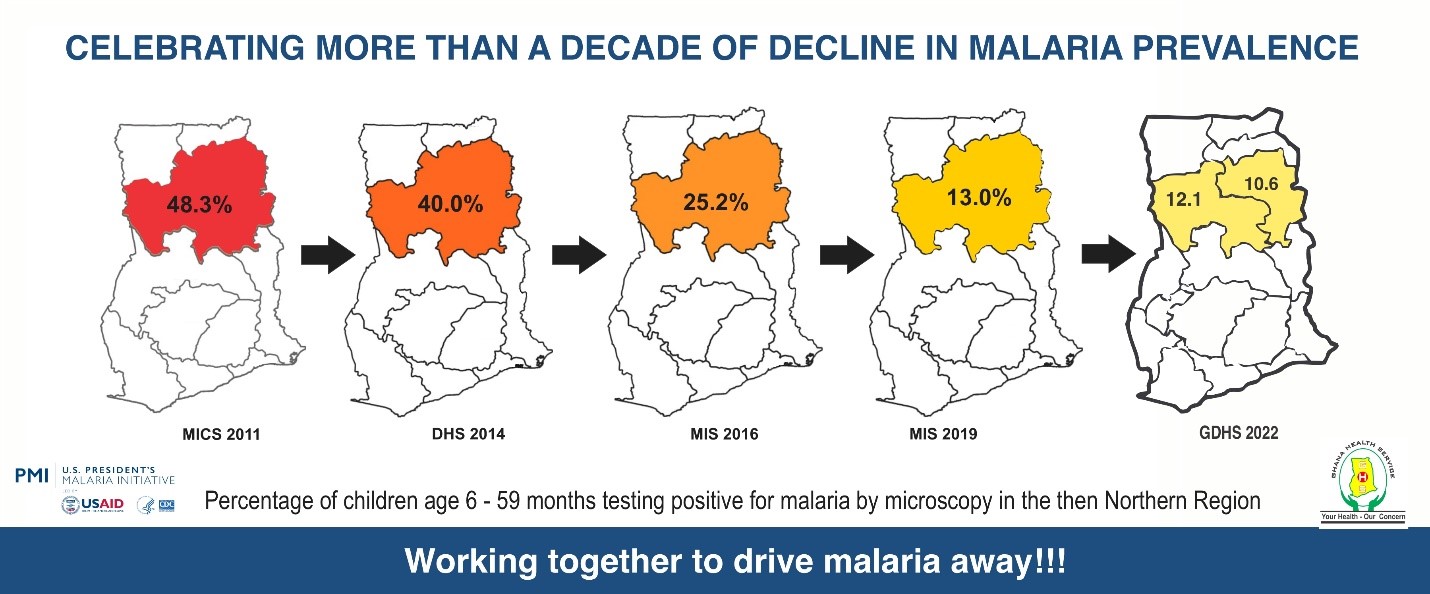
Presentations by the health directorates in the Northern and Northeast regions showed that malaria mortality in some districts where VectorLink Ghana operates had decreased, with some districts recording no malaria-related deaths in children under five in the last three years. VectorLink Ghana, through implementing IRS, helped protect 1,021,269 people from malaria, including 168,872 children under five.
CDC Resident Advisor Nana Wilson echoed the achievement of this progress, stating that “we started in 2011 with a 27.5% [malaria] prevalence nationally and all the way to 2022, which is just last year, we’ve been able to reach 8.6% prevalence, which means that what we are doing is working… Even though it has reduced drastically, and we are happy with it, we are aiming [toward] zero malaria, so we have a lot of work to do. But this is an achievement. I think we have to be proud of ourselves.”
All stakeholders attending the closeout meeting expressed their commitment to supporting the continued implementation of vector control interventions under PMI Evolve.
Excellent work demonstrating continued success in reducing the burden of malaria, VL Ghana!
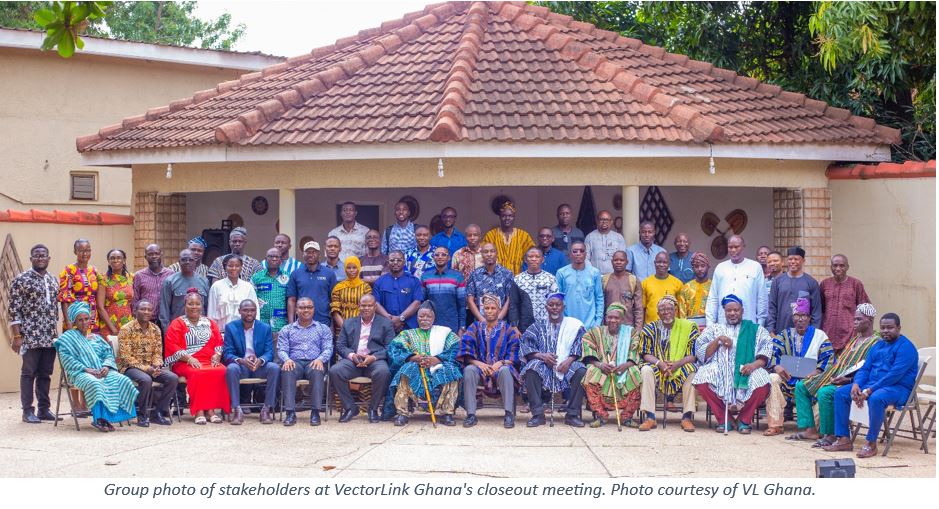


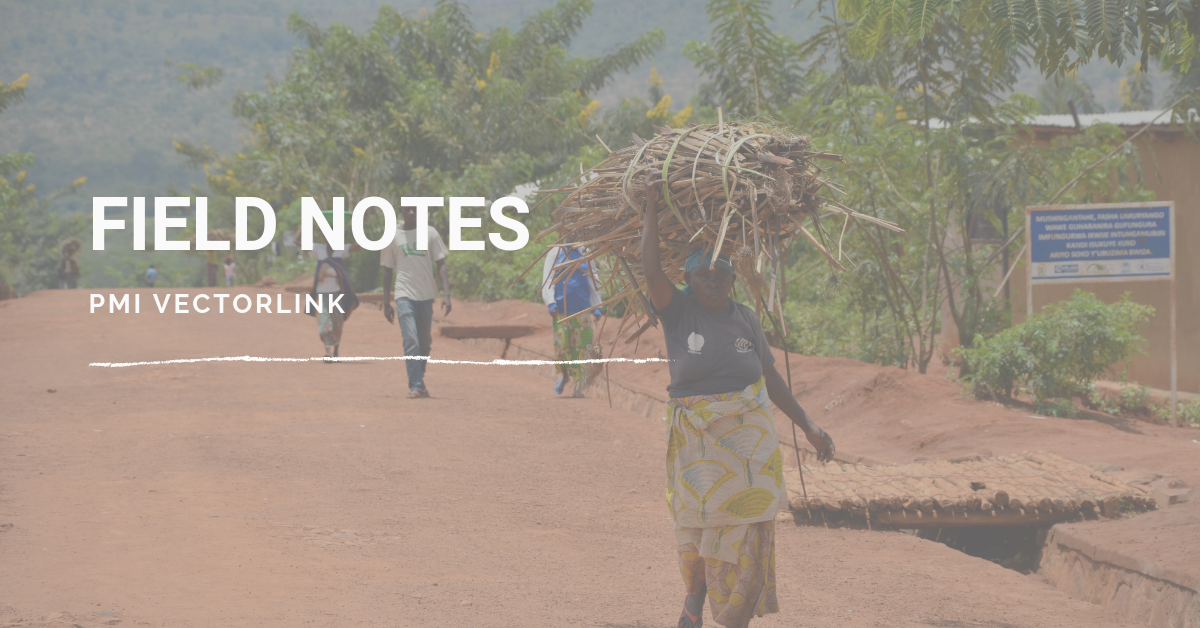
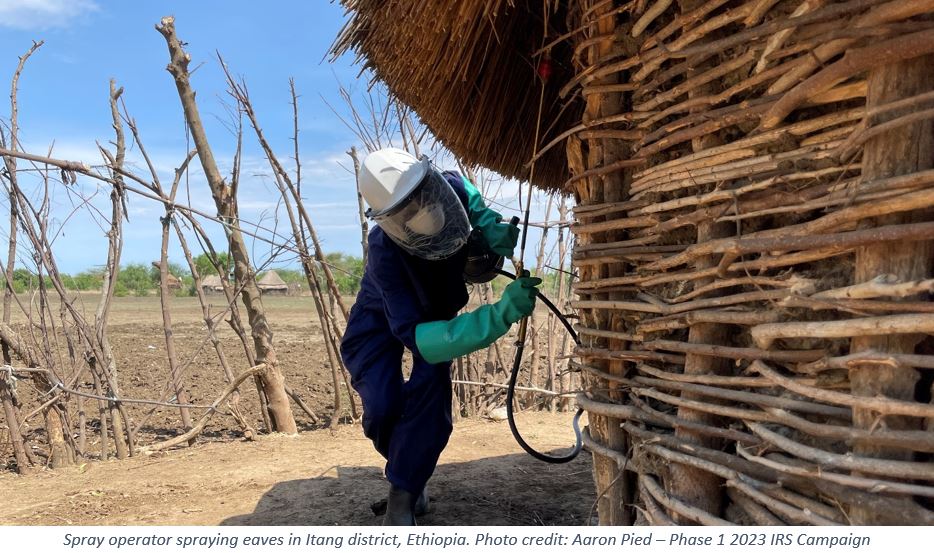 The PMI VectorLink Ethiopia team has been busy! Many would say they are a constant source of motivation, in this week’s case, Monday Motivation! They just completed the second and final phase of the 2023 indoor residual spraying campaign while simultaneously implementing the 11th consecutive month of Larval Source Management (LSM) for An. stephensi control in eight towns. In the same time frame, the team successfully transitioned ownership of LSM operations to six town administrations.
The PMI VectorLink Ethiopia team has been busy! Many would say they are a constant source of motivation, in this week’s case, Monday Motivation! They just completed the second and final phase of the 2023 indoor residual spraying campaign while simultaneously implementing the 11th consecutive month of Larval Source Management (LSM) for An. stephensi control in eight towns. In the same time frame, the team successfully transitioned ownership of LSM operations to six town administrations.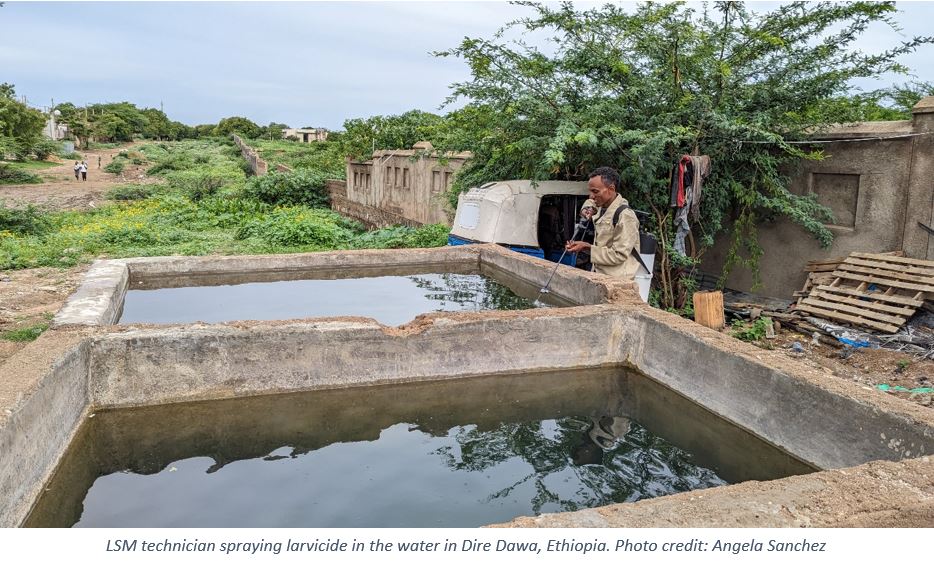
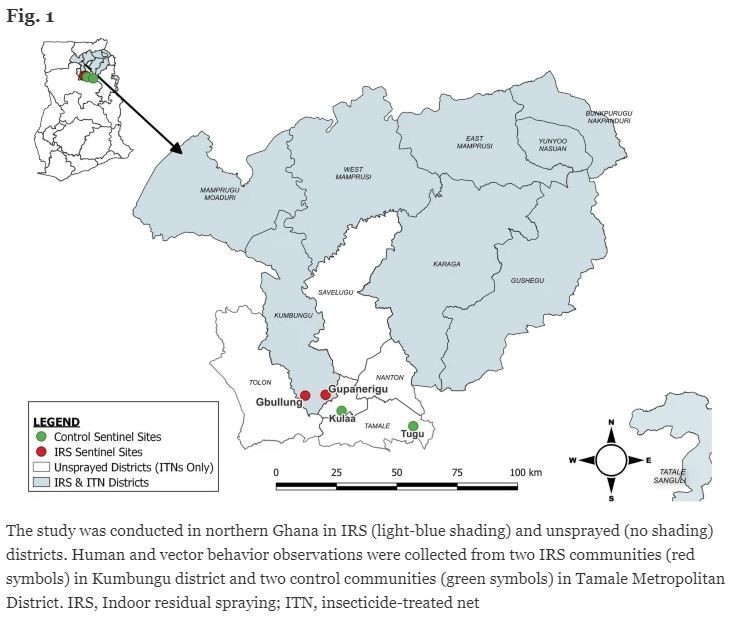 For this week’s Monday Motivation, we are featuring our team in Ghana who just had a new article published in Parasites & Vectors on “
For this week’s Monday Motivation, we are featuring our team in Ghana who just had a new article published in Parasites & Vectors on “ This week’s Monday Motivation celebrates the addition of a new journal article highlighting PMI VectorLink’s contributions to counteracting gender barriers in vector control. The article, Expanding the Role of Women in Vector Control: Case Studies from Madagascar, Rwanda, and Zambia, was published in Global Health: Science and Practice and can be accessed
This week’s Monday Motivation celebrates the addition of a new journal article highlighting PMI VectorLink’s contributions to counteracting gender barriers in vector control. The article, Expanding the Role of Women in Vector Control: Case Studies from Madagascar, Rwanda, and Zambia, was published in Global Health: Science and Practice and can be accessed 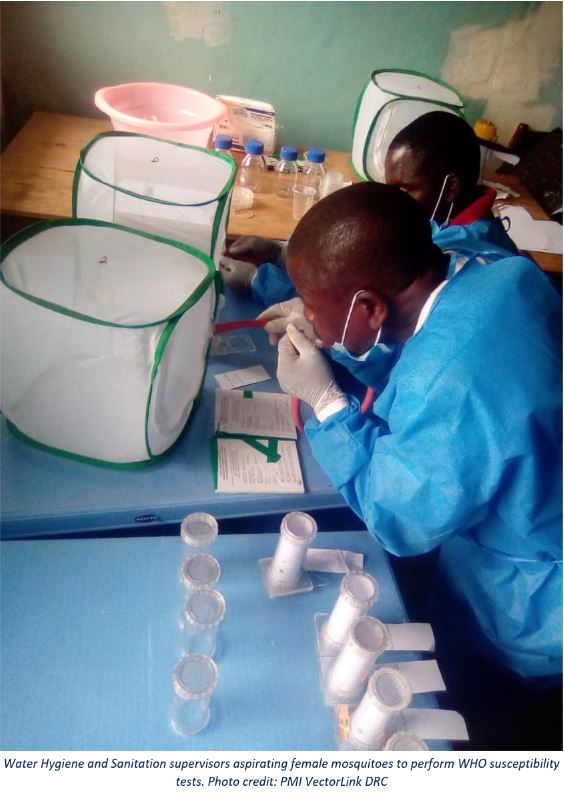 How can insecticide resistance testing occur when certain areas within a country are inaccessible due to insecurity? In the Democratic Republic of Congo (DRC), the PMI VectorLink team dealt with just that. Insecticide resistance testing helps inform insecticide-treated net (ITN) selection, so it’s important that data collected from these tests is representative of the country. For this week’s Monday Motivation, we’re highlighting the PMI VectorLink DRC team for working with the National Malaria Control Program (NMCP) to pilot a community-based approach to insecticide resistance testing in areas with limited accessibility.
How can insecticide resistance testing occur when certain areas within a country are inaccessible due to insecurity? In the Democratic Republic of Congo (DRC), the PMI VectorLink team dealt with just that. Insecticide resistance testing helps inform insecticide-treated net (ITN) selection, so it’s important that data collected from these tests is representative of the country. For this week’s Monday Motivation, we’re highlighting the PMI VectorLink DRC team for working with the National Malaria Control Program (NMCP) to pilot a community-based approach to insecticide resistance testing in areas with limited accessibility. Assessing the durability, or useful life, of mosquito nets in the field is critical to ensuring they are working properly by blocking and killing mosquitoes. This helps national malaria programs determine how frequently nets need to be replaced. Data collectors travel to communities to conduct durability monitoring (DM) on the same nets four times: a baseline assessment right after a mass distribution campaign, and then 12, 24, and 36 months after.
Assessing the durability, or useful life, of mosquito nets in the field is critical to ensuring they are working properly by blocking and killing mosquitoes. This helps national malaria programs determine how frequently nets need to be replaced. Data collectors travel to communities to conduct durability monitoring (DM) on the same nets four times: a baseline assessment right after a mass distribution campaign, and then 12, 24, and 36 months after.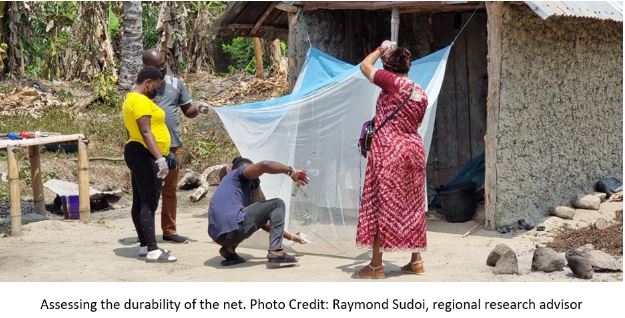
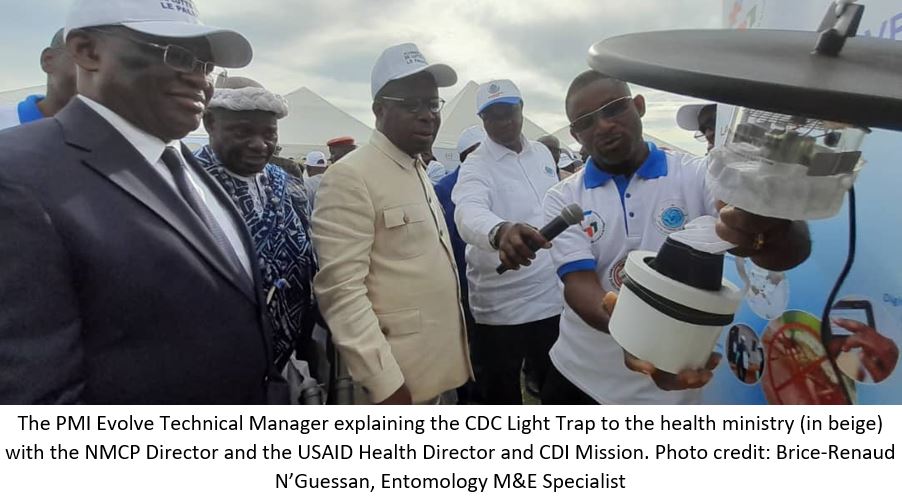 World Malaria Day may be April 25, but the commemoration was extended for Côte d’Ivoire. On Friday April 28, the Ministry of Health and the National Malaria Control Program celebrated its 16th Annual World Malaria Day event in Grand Morie Village, Agboville health district. This week’s Monday Motivation celebrates the PMI Evolve Côte d’Ivoire team for highlighting why their activities are so important to malaria control decision-making in Côte d’Ivoire.
World Malaria Day may be April 25, but the commemoration was extended for Côte d’Ivoire. On Friday April 28, the Ministry of Health and the National Malaria Control Program celebrated its 16th Annual World Malaria Day event in Grand Morie Village, Agboville health district. This week’s Monday Motivation celebrates the PMI Evolve Côte d’Ivoire team for highlighting why their activities are so important to malaria control decision-making in Côte d’Ivoire.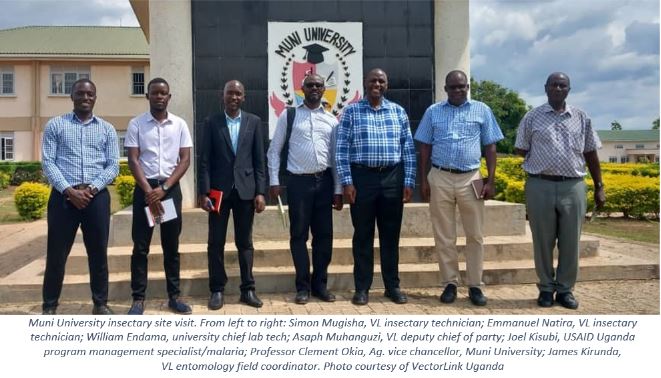 We all know susceptible mosquitoes are necessary to test the effectiveness of malaria control interventions. Entomologists rely on sustained access to susceptible mosquitoes to advance knowledge about vector control. This week’s Monday Motivation goes to the VectorLink Uganda team who is working with the Ministry of Health to support not just one insectary, but four, located across the country at Gulu University, Kampala Vector Control Division (VCD), Muni University, and Tororo Hospital (the insectaries at Gulu University, Kampala VCD and Tororo Hospital have been open since the PMI VectorLink Project began).
We all know susceptible mosquitoes are necessary to test the effectiveness of malaria control interventions. Entomologists rely on sustained access to susceptible mosquitoes to advance knowledge about vector control. This week’s Monday Motivation goes to the VectorLink Uganda team who is working with the Ministry of Health to support not just one insectary, but four, located across the country at Gulu University, Kampala Vector Control Division (VCD), Muni University, and Tororo Hospital (the insectaries at Gulu University, Kampala VCD and Tororo Hospital have been open since the PMI VectorLink Project began).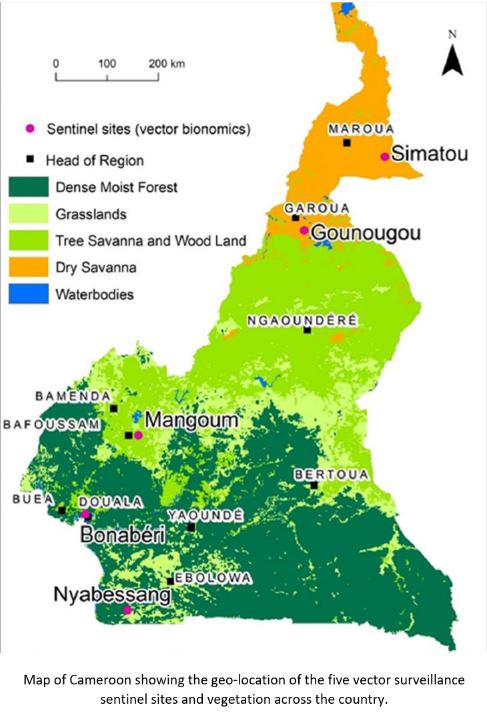 This week’s Monday Motivation goes to the PMI VectorLink Cameroon team for their recently published article in Malaria Journal on “High vector diversity and malaria transmission dynamics in five sentinel sites in Cameroon.”
This week’s Monday Motivation goes to the PMI VectorLink Cameroon team for their recently published article in Malaria Journal on “High vector diversity and malaria transmission dynamics in five sentinel sites in Cameroon.”